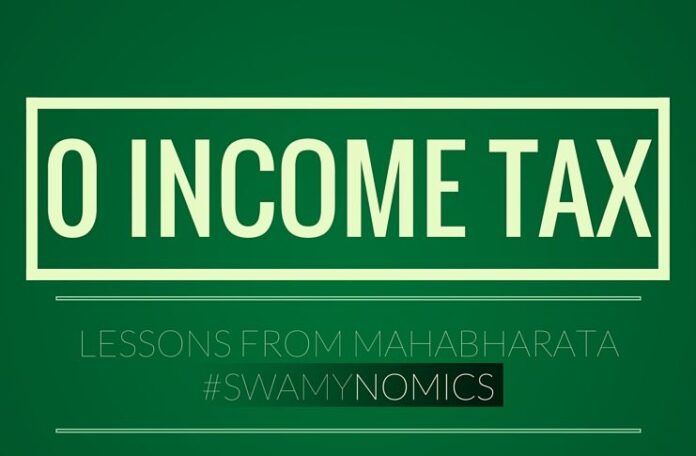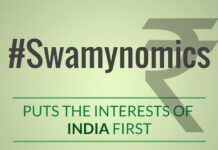
In Mahabharata, Krishna started his campaign against Kansa with a protest against the income tax. He encouraged the dwellers of Gokul not to pay the income tax (Kar) imposed on them by Kansa. Escalation of the conflict between the people of Gokul and the state of Mathura culminated in Kansa’s death at the hands of Krishna. This episode has a striking resemblance to how the United States was founded. In 1765, the American Colonial Society rejected the authority of the British to levy taxes on the people of America. Escalation of this conflict resulted in the defeat of the British and the independence of America in 1776. Between 1776 and 1913, when the United States grew at its fastest pace to become a superpower, the country did not have an income tax (only corporate profits were taxed). The money people earned remained in their hands to be spent on what they deemed fit.
When Krishna tried to convince the people of Gokul not to pay their taxes, he pointed out to them how Kansa, as a king, had abdicated his primary responsibility of protecting the life and property of the people of Gokul. Mahabharata starts with king Bharat defining the role of a government (king). When he announced his decision not to hand over his throne to any of his nine sons, he described the three responsibilities of a king and emphasized that these are his only responsibilities. The first is to protect the life and property of the people from external attacks, the second is to provide justice to the people, and the third is to nominate a worthy successor.
Bharat did not mention redistribution of wealth as a responsibility of a king. It was Duryodhan who later violated this principle and started giving away money (gold) in the treasury (Raj Kosh) to the people of Hastinapur to get public opinion in his favor when he faced a threat from the Pandavas. Charity is embedded in the Hindu culture. A government, by enforcing redistribution, can only demonstrate its distrust of the people.
Since FDR’s new deal in the 1930’s, the U.S. has continued to abandon the principle of minimal taxation and limited government and has started walking on Duryodhan’s path. In 2008, after allowing gambling in the Wall Street casinos, the U.S. government stripped the constitution, laid down by the seven founding fathers, by bailing out the banks, in plain sight, the same way Duhshasana tried to strip Draupadi, wife of the five great warriors, in front of the people who were entrusted with the responsibility of protecting the fundamental principles of governance laid down by king Bharat.
The Indian government needs to learn from Mahabharata, and listen to Dr. Subramanian Swamy when he says that the government should abolish the income tax. The government can perform the three core functions prescribed in Mahabharata without the burden of income tax on the people of India.
It is strongly recommended that you read the following two articles to understand how important it is to get rid of the income tax, and to focus on empowering the judiciary. The article Republic of Ghaziabad – Part I explains in layman’s terms how income tax is impeding our economic progress. The article Breaking One Shackle Of The Fatal Conceit explains with the help of an analogy, how the government of India is making the same mistakes that have kept India trapped in poverty for seventy years.
Note:
1. Text in Blue points to additional data on the topic.
- Solution to Kashmir: A Lesson From The Prairies, the Pampas and the Kashyaps - February 12, 2019
- Kartavya,Adhikaar And Skill. A Worthy recipient of Skill India Scheme? - October 16, 2017
- Demonetization Has Opened A Window Of Opportunity For Modi - December 21, 2016











Unless you have Manufacturing kick off, nobody can remove income taxation.
The very same politicians claim there are 500-600 million people in India who are poor. I guess there are more than that. Coming to the point, the income tax payed by tax payers, somewhat manages & reduces the burden off govt, though the taxes collected are not that huge if compared to the GDP and Economy of the country.
Now imagine, if income tax is abolished the revenue for the govt will dip, what will happen to the inflation and prices of commodities? Only a few will be able to afford various daily items. The ghost of inflation will eat up the 500-600 mill poor and lower middle class.
As of now, Govt needs to increase the net for income tax, which I believe has already been initiated last week. this actually will help relaxing the prices on the commodities and the money will be used for further development.
This is not going to be easy, there is a lot of patience and support is required to be given to the Govt.
The key, as always and the bigger pain for us Indians is that we rely more on imported goods, rather manufacturing here. We need more n more entrepreneurs, those who can come up with multiple fields, not just IT, website and App development.
Note – I have high regards for Dr.Swamy and his views. My intention is not to oppose what he says, but to make my point here and contribute to the debate.
Thanks!
Dear Sir,
An excellent piece – also the links you have shared are very well-researched and true eye-openers.
Just want to add a couple of points:
a. In the entire history of pre-colonial India, taxes have been at most 8% – never did we have 30%+ tax slabs. Even the most usurious and tyrannical despotic mass murdering Mughal King like Aurganzeb had around 22% tax rates for Kafir infidels. This gives a good indication of what modern governments are.
b. An average “educated” Indian is poor at maths because Western education has ruined his faculties. Not only is one paying 30% direct taxes – he is also paying taxes on interest income, service taxes, VAT and indirectly paying through his nose corporate taxes which the corporate pass on to him. Effective tax for an average salaried 30% slab guy is close to 66%. The government graciously allows us to keep Rs 34 out of Rs 100, and usurps Rs 66. If this is not robbery, what is? [Rhetorical question]
Current govt is a disappointment – neither do I see a Ram Mandir, nor do I see Pakistan bombed to smithereens nor do I see any money; and Shri Jaitley – the less we talk about him the better. He is a pucca Lyutens guy and what we Bengalis call “flop master general” – he is on a mission to eradicate the middle class and the senior citizens, and make our lives miserable.
Nice and Interesting article.
nice article. I have written about judiciary reform. Someone pls do surgery on my article;so I can forward it to chief justice. http://www.indianjudicaryreform.blogspot.com
Restructure the judiciary…..
In ancient times, social status, power and the ability to feed oneself were not determined solely by the amount of money one had. So to quote Mahabharata as being against re-distribution is plain wrong and misguided. Also increasing wealth inequality also leads to injustice in today’s society since the ones who have more are able to buy governments, policies and laws, in addition to buying and controlling businesses. This will leave people defenceless against the depradations of the more powerful/wealthy. This is against dharma, which it is a king’s duty to protect. The Mahabharata does say that a King who cannot protect dharma is no better than a mad dog.
re-distribution was done by adharmic people to gain support, just like our modern day adharmic politicians do it for votes. Paying basic income with motive to bring dharma (balance) in every individual’s life is a different story. Mahabharatha is against taxes and abolishing it now is like giving basic income to people
Dr. Panigrahi, Thank you for your comments. You are right about how pseudo and studio-intellectuals might react to a mention of Hindu scriptures. Intellectuals in the U.S. often quote from Hindu scriptures and follow them closely. Here is a famous example, a quote from Oppenheimer who created the Atom Bomb: https://www.youtube.com/watch?v=ZuRvBoLu4t0
The first objection to this proposal will arise from the anti-Hindus in India in the form of seculars, communists, progressives, arm chair intellectuals and award returners that the country is sought to be pushed into dark ages by quoting from Mahabharata.
Second ,did America progress or regress after introducing hefty tax imposition and whether that country should be a role model for other democracies.
Thirdly a dillusion has been created over the decades that peoples welfare is being done with tax income, so with no taxes flowing into the Govt treasury those who have become addictd to enjoy life without sweat will raise hell and murder. Are there any effective ways to wean away work shirkers to attract them to live through honest labor and allow merit to flourish?
Ayn Rand in Atlas Shrugged addressed this very issue..by suggesting that producers should withdraw to Galt’s Gulch from the welfare state, and return after the destruction of the welfare state is complete.